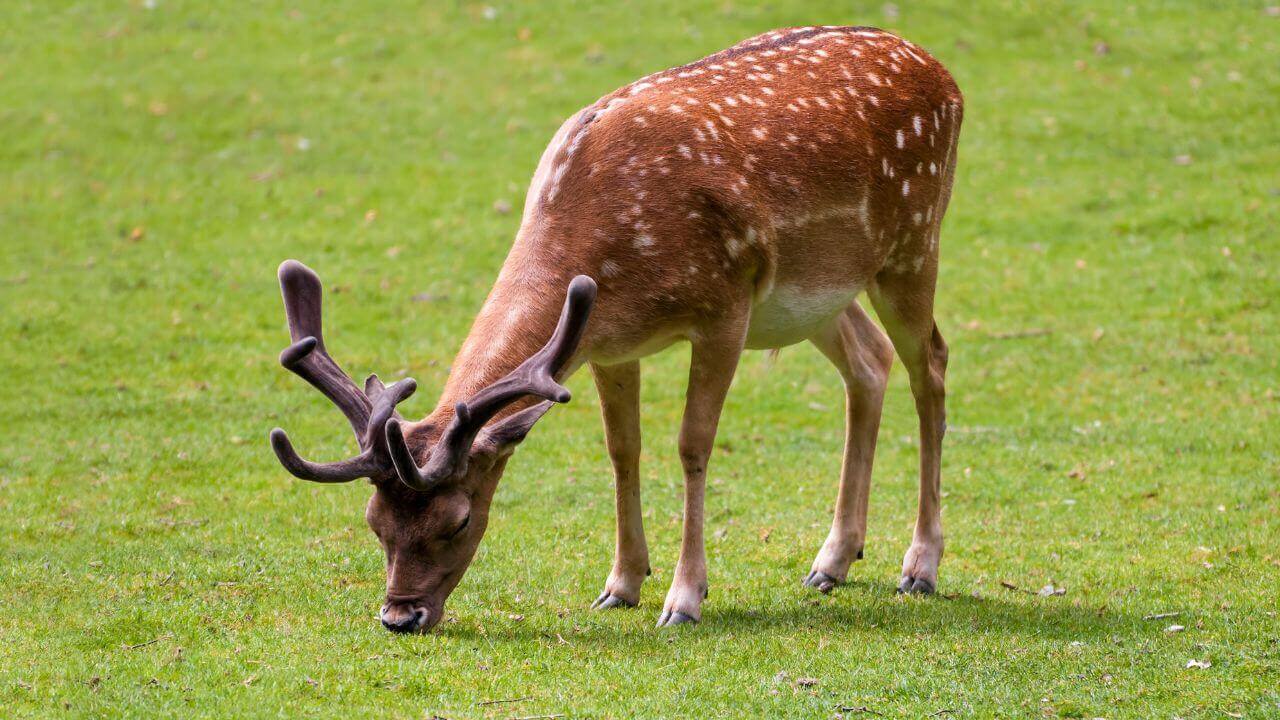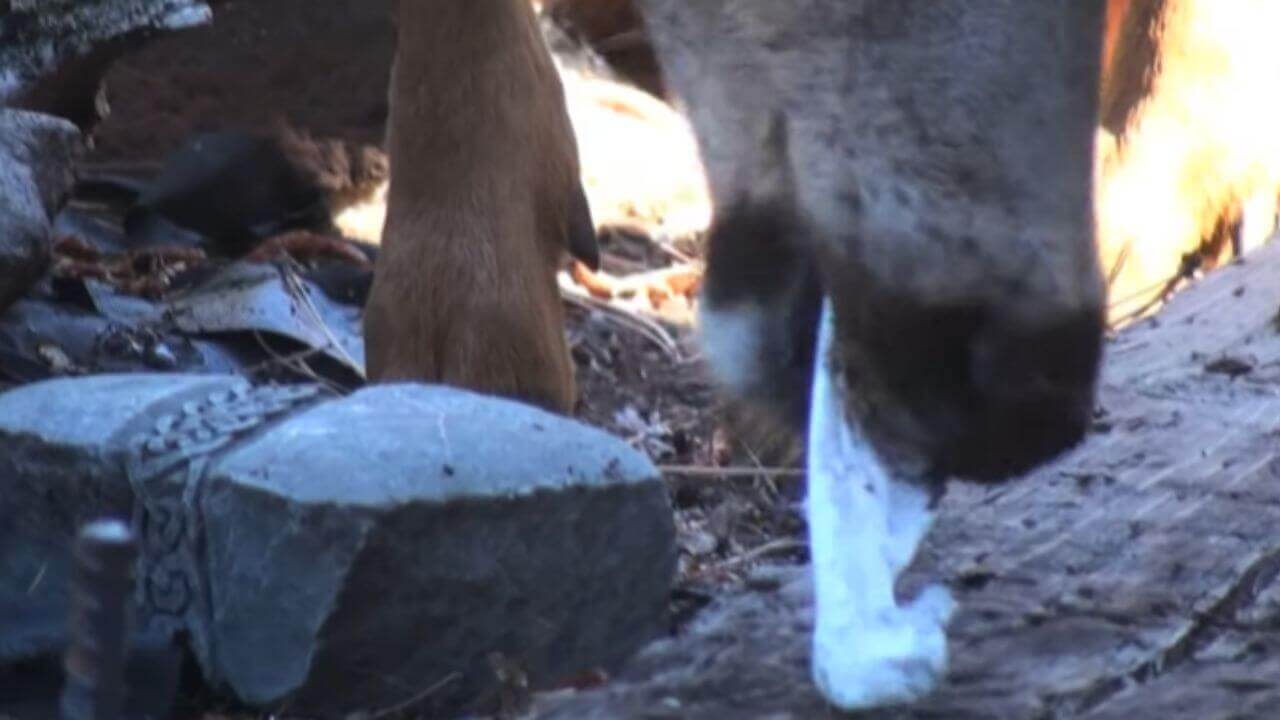Deer are majestic animals and they live around the world, but what they eat is up for debate. Some people think deer eat both vegetation and flesh, but others say they only consume plants.
So, are deer omnivores, or are deer herbivores? The short answer is that they are herbivorous. Nevertheless, there have been some rare incidents where deer have been found eating birds and some meat. But they’re very rare, like one in a hundred. Therefore, we cannot assert that deer are omniverse based on the basis of these extremely infrequent incidences alone.
Primarily, deer are herbivores by nature. Their main source of food are leaves, twigs, plants, grass, and woody portions of leaves and stems. They can ingest a wide variety of vegetation and fruits from woody plants, berries, nuts, flowers, and more. Additionally, they are also ruminants, meaning they chew the cud that is regurgitated by their rumens. This is natural process for deer where the cud is regurgitated, chewed again, and swallowed. This way, the deer digest food easier when they chew, breaking it down into easy-to-digest pieces.
What are the Primary Sources of Food for Deer?

Deer diet varies with the change in season. They eat differently in summer and different in winter. Especially in winter, they struggle to find significant food sources. Weeds are deer favorites because of their nutritious and easy-to-digest nature. Due to long dry periods and winter, they can’t eat weeds year-round. Therefore, deer rely on browsing plants like young trees and shrubs. These types of plants are available all year round.
Deer eat a wide variety of foods, including twigs, leaves, weeds (or forbs), nuts, grass, etc. These are the primary source of food for them.
However, fruits are also a good treat for deer. They have found plenty of times eating apples, oranges, pumpkins, bananas, pears, berries, plums, and persimmons. Deer are drawn to them due to their sweet taste and pleasant smell.
In addition to fruits, vegetables also fall into the category of deer’s preferred foods. Among the favorite foods of deer are carrots, beets, cabbage, Brussels sprouts, tomatoes, broccoli, and beans. There is no doubt that these hoofed mammals obtain a great deal of nutrition from these garden-variety vegetables. Homeowners with gardens often struggle to get rid of deer as they visit their gardens again and again in the hope of eating these delicious vegetables.
Flowers are blessings of nature. They bring life to any outdoor space and can easily brighten up a dull color scheme. Deer are also attracted by their pretty colors and fragrance. Specifically, deer love tulips, lilies, roses, pansies, and dahlias. These flowers don’t provide enough nutrition and hydration, but they can be a handy treat to have.
Deer Spotted Eating Bones
Have you imagined deer chewing bones? If not, then check the video below, where a guy filmed deer eating and chewing bones.
Surprised…! I was also once shocked to see a deer actually chewing bones and trying to swallow them. I know deer are picky eaters, but I have never seen and imagined a deer chewing bones unless I saw this video.
It’s hard to explain this eating behavior; perhaps the buck was too hungry to eat anything. Technically speaking, if you observe deer’s teeth structure, they do not have the canine tooth that many carnivores have to tear the meat. So naturally, their teeth are not designed for chewing and eating meat. And I do believe if there are significant food sources available to deer, there are no reasons it would prefer to eat bones.
Deer Energy Requirement for Survival
Deer need a well-balanced diet to survive. That’s why you will often find them eating. Just like humans, they also need essential proteins and vitamins. They also need fat and carbohydrates for a healthy body.
They need a high-protein diet all around the year.
A pregnant deer, in particular, need more energy and a nutritious diet so she can give birth to a fawn. A study conducted by S. H. Smith, J. B. Holter, H. H. Hayes, and H. Silver on “Protein Requirement of White-Tailed Deer Fawns” shared their findings :
Based on analysis, it was estimated that the fawn required 19 grams of digestible crude protein per kilogram of metabolic body weight per day in order to achieve maximum growth (retention of dietary protein).
Another research conducted by G. McL. Dryden, where he stated that:
It is estimated that the average daily net energy requirement (NEm) of adult, non-lactating deer during winter and spring is 0.39 MJ/W (kg)0.75 per day.
The protein ranges recommended for deer diets to be adequate for maintenance and production is reported to be 4%–9% and 16–22%, respectively.
Drinking water consumption by deer is calculated on a ratio of water to dry matter of 3.5:1 and daily consumption of 139 g of water per kilogram of dry matter.
Deer Eating a Bird
This one will also surprise you just like it surprised me. See the video below of a deer eating a bird and check the reaction of women at the end.
This deer has been observed to eat small songbird, which are small birds.
Due to their diverse diets, deer are likely to hunt down and consume some unsuspecting avians when given a chance. Even though grasses, bark, foliage, and crop plants are the main sources of nutrition for deer, but you never know there are always surprises!
Why do Deer Sometimes Eat Meat, Bones, and Birds?

There is no scientific answer to this question, but one logical answer is they will eat such things if they are hungry. As they face difficult times when food sources are just not enough to meet their hunger, they will just chew anything doesn’t matter if that are bones or birds. And this behavior is common in many animals; if they are not able to find their main food, they will always go for alternate sources.
Is it Safe for Deer to Eat Meat and Bones?
The deer like to eat plants and grass most of the time, but they do eat meat sometimes. However, that doesn’t mean it is part of their staple diet. It is not safe and healthy for deer to eat meat. Bones and meat are not good for deer. It can cause stomach upset for them.
The teeth of deer aren’t strong enough to tear apart flesh, and even smaller pieces of meat are hard for them to digest because their stomachs aren’t designed to digest meat.
Related Posts

Hi, my name is Basit Ali Chaudhary. I am the guy behind Smart Bow Hunting. I started this blog as a way to share my passion for archery and bow hunting with the world. I love experimenting with new ventures and trying new things. Archery is my passion, and so is bow hunting.
I started this site as a way to share my knowledge and help people overcome the challenges of bow hunting. I want to teach them everything I know about the sport. You can read the comprehensive blog posts and articles that will provide you with everything you need to know to take your bow hunting skills to the next level.

